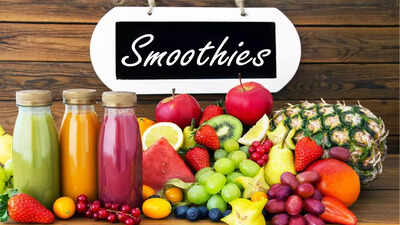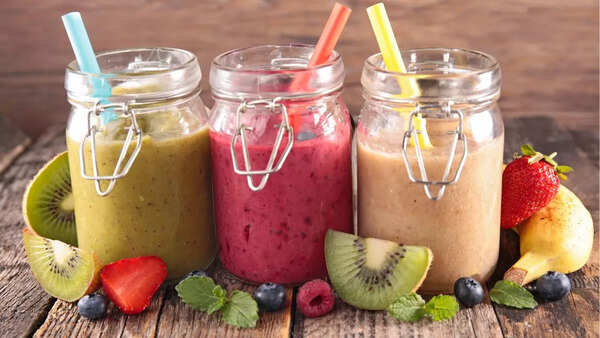ARTICLE AD BOX

Smoothies are a perfect breakfast option, packed with nutrients, and are convenient to make. They’re perfect for busy mornings, providing a quick and refreshing start to the day.
Loaded with fruits, vegetables, and wholesome other ingredients, smoothies can be tailored according to your taste and preferences. With endless combinations of ingredients, you can create a smoothie that’s both delicious and nutritious. Whether you want to boost your energy, support weight management, or simply enjoy a healthy breakfast, smoothies are an excellent choice. But there are some potential drawbacks to having smoothies for breakfast, too.
What is in a smoothie? Top ingredients for a healthy and delicious blend
A smoothie is a cold, blended drink made from a mixture of ingredients, typically fruits, vegetables, and a liquid base like milk or water, pureed together in a blender to create a smooth and creamy texture. Some of the popular ingredients:
- Green sticky vegetables such as cucumbers, sprouts, and celery.
- Fresh, frozen fruit like berries, mango, pineapple, apples, bananas, oranges, pomegranate, cherries, kiwi, watermelon, coconut, and pears.
- Vegetables like carrots, beets, and cauliflower.
- Avocados.
- Cacao and cacao nibs.
- Oats.
- Nuts.
- Yogurt, both dairy and plant-based.
- Milk, both dairy and plant-based.
- Nuts such as peanuts and almonds.
- Tahini.
- Seeds, such as chia, flax, and hemp.
- Spices such as fresh ginger root, cinnamon, and turmeric.
- Fruit juices such as apple and cranberry.
- Sweeteners such as honey, dates, maple syrup, and stevia.
- Matcha.
- Crushed ice.
Health benefits of a smoothie

- Packed with nutrients: It contains fruits, veggies, and other ingredients that provide vitamins, minerals, fiber, and antioxidants.
- Convenience: Smoothies are easy to make, portable, and perfect for busy lifestyle.
- Increased fruit and vegetable intake: Smoothies can help you meet daily serving recommendations, reducing the risk of chronic diseases.
- Digestive health: Fiber-rich smoothies support gut health and diversity.
- Easy nutrient absorption: Blending breaks down cellular structures, making nutrients more accessible.
- Weight management: Portion-controlled smoothies can help with weight loss and reduce the craving for unhealthy snacks.
Drawbacks of drinking smoothies regularly
- High added sugar content: Consuming excessive added sugars can lead to calorie intake beyond recommended limits.
- Lack of satiety: Smoothies without protein, fiber, and healthy fats may not keep you full, leading to overeating.
- Health risks from extreme diets: Smoothie cleanses or detox programs can be detrimental due to severe calorie restriction and potential nutrient deficiencies.
Being mindful of ingredients and portion sizes can help mitigate these risks.
Popular types of smoothies:

1. Green Smoothies- Made with greens such as spinach, greens such as kale, or greens like arugula, blended with fruits and veggies to hide the bitter tastes.
2. Fruit Smoothies- Made with a variety of fruits, which can be fresh, canned, or frozen. Common examples include bananas, fresh or frozen berries, or any of your favourite fruits3. Protein Smoothies- A smoothie designed to add protein to your diet. Protein may come from animal or plant-based sources such as milk, yogurt, or protein powder. This smoothie type tends to be popular with the fitness crowd, who often consume these to help build and repair muscle.Also read | Love mayonnaise? Here’s what it might be doing to your health



.png)
.png)
.png)
















 2 hours ago
3
2 hours ago
3







 English (US) ·
English (US) ·